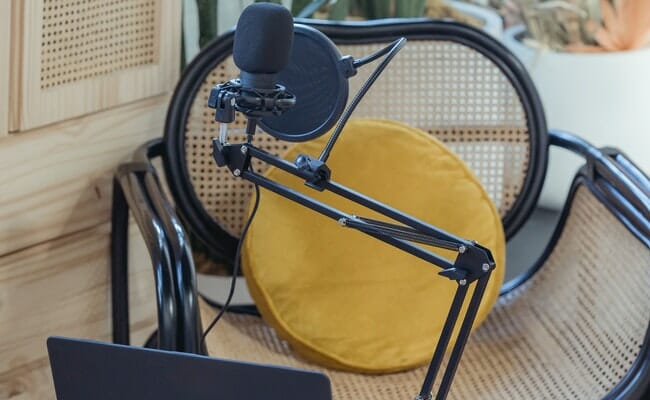Growing Your Brand Through Podcast Marketing
What if I tell you that marketing with radio shows still works nowadays? It has turned into podcasts, so it can now gain millions of listeners worldwide. More importantly, it is a great way to connect your brand to a target audience.
The best part is that anyone can start a podcast with little to no budget. Of course, you will need top-notch tools and strategies to get the best results for marketing. Fortunately, this article will discuss all you need to start marketing with podcasting.
We will go through all you need to start using podcasts for marketing, from planning your shows to launching podcast ads. After that, we will elaborate on what it can do for your marketing campaign. There is a lot to cover, so let us begin!
Here are the steps to using podcasts in marketing:
- Set marketing goals to determine your podcast’s theme.
- Pick the appropriate format and platform.
- Choose the ideal format.
- Prepare the necessary software and hardware.
- Record your first podcast episode.
- Polish your podcast for post-production.
- Promote your podcast.
1. Determine your podcast’s theme based on your marketing goals.

As with any marketing strategy, you must begin with your objectives. What do you want your podcast to do for your brand? Podcasts are best suited for the interest stage of a sales funnel.
As mentioned earlier, ye olde radio shows adopted a digital format as podcasts. They feature a podcast host speaking with guests about specific topics.
Their conversations can cover a wide range of issues. They could be as mundane as critiquing a movie to as severe as discussing an imminent recession.
Podcasts are not ideal for the Awareness stage of a funnel since they typically span an hour. Yet, it is a great way to connect your brand to people who already know about it.
Let us say you have a cryptocurrency trading app, and you somehow had Warren Buffett on your podcast. You and the Oracle of Omaha may discuss how it convinced him to invest in digital assets.
He has repeatedly stood against cryptos, so changing his mind with your app would draw investors into your podcasts. Those folks have an idea about crypto trading, so your podcast could spur their interest.
Podcasts work as sponsored content, so they do not revolve around your brand. Instead, they build brand image and spark curiosity for a target audience.
If you have a crypto trading company, start a podcast that discusses trends for that digital asset. Focus on a specific aspect of cryptocurrency, but confirm that your idea does not match an existing podcast.
What’s more, you should design a unique logo for your podcast. People should immediately recognize your podcast in their mobile app.
2. Pick the appropriate platform.
You needed the help of a recording studio to host an audio interview back then. Now, you can post your podcast on the internet and get millions more views.
However, you will need to find the most appropriate podcast hosting platform. You have numerous options, such as SoundCloud and PodBean.
If you have a Western audience, you might prefer to release Apple podcasts. Contrary to popular belief, iTunes does not host these audio shows.
Opening these sites direct you to the podcast platforms that contain your chosen episodes. On the other hand, a few podcast apps like Spotify allow users to upload their series.
Surprisingly, the best place for your podcast is a video streaming platform: YouTube. Nowadays, video content is a highly effective marketing tool. More importantly, it is free!
Posting your podcast in this format will help non-podcast listeners appreciate your series. Meanwhile, others could let it play in the background as they focus on their tasks.
3. Choose the ideal format.
Once you choose your preferred podcast hosting site, you should choose a format for your series. Here are some examples:
- Interview – This type of podcast involves a host who speaks with another person relevant to a specific topic. The host asks questions to direct the conversation. This format works well with the legal, financial, and business services industries since the guest could share valuable insights.
- Monologue – This format is not common in podcasting because it only involves one person talking about a topic. The episodes can become tiresome as they cannot benefit from banter with different guests.
- Co-hosted – This podcast format involves two hosts sharing lessons and insights. Some listeners prefer this type of podcast because it sounds closer to a natural conversation than a series of questions.
- Panel – This format is like an interview podcast, except it involves more people. This type of podcast also sounds like a regular conversation among pals.
- Non-fictional storytelling – Podcasts with this format discuss real-life events. For example, it could narrate a hike to the peak of Mount Everest or report the news. It is an excellent format for teaching people about general facts.
- Podcast theater – This format involves a fictional story told only through voices and sound effects. The theater format is not a viable format for business podcasts due to its nature.
- Repurposed content – Other podcasts repurpose other types of content into audio files. For example, the Valuetainment podcast repeats episodes from its YouTube episodes. If some of your marketing strategies are not working, converting them into podcasts may improve their effectiveness.
This type of content is highly versatile, so you might want to try creating your own podcast format. Perhaps you could improve it so that it better serves your marketing strategy.
4. Prepare the necessary software and hardware.
You need four things to start a podcast: an indoor space, a microphone, a camera, and video software. First, you must find a room that can fit your host and guests.
It should not be too spacious, or your microphone will not correctly capture sound. Second, you need a decent microphone. Blue Yeti mics deliver high quality and affordability.
Third, you will need a quality camera. Nowadays, iPhone cameras deliver enough resolution for crisp movie-like images, and they are great for creating Apple podcasts.
Of course, your marketing strategy deserves the best equipment. Here are the necessary tools to host a professional-quality podcast:
- Host your talk show in a room with sound-absorbing foam. It must also contain decorations related to your themes, such as potted plants or bookshelves.
- Prepare condenser mics for each person in your podcasts, including guests. You must also have shock absorbers to prevent your microphones from picking up unnecessary sounds.
- Record your podcasts using Adobe Audition since it has robust editing features and a user-friendly interface. You may also use Adobe After Effects for creating podcast videos. However, you will need to pay a subscription to use these programs.
- Install multiple high-definition cameras for your podcast room. Your goal is to have various angles you can cut and compile for the video format.
Be sure to have people who know how to operate these programs. You want someone who has enough years of experience. Perhaps you have staff members who already possess the capability.
If not, you may want to hire a new staff member. You need someone capable of polishing your episodes within a reasonable time frame.
5. Record your first podcast episode.
Prepare for your first episode once you have all the necessary tools. A podcast must sound like a natural conversation, but you still need to plan it.
You should not provide a word-per-word script, but you must have a topic outline. To explain how the process works, let us say you will host an interview podcast.
Your host should know the questions he must ask to see how to direct the conversation. Also, it would be helpful if your host rehearses beforehand.
Public speaking is a skill, and your host should appear and speak confidently. That way, your podcast will be able to assert the show as a reputable name in your industry.
Aside from establishing an authoritative presence, podcasts should come out at the right time. Make sure it has a high chance of being seen by potential customers.
Ensure that all your equipment functions properly before the release of your first episode. Make sure you have a quiet room before that date.
Look for things that may create noise during the show. Everyone should keep their phones in silent mode while recording an episode. Once everything is ready, hit record and watch your host speak.
6. Polish your podcast for post-production.
Edit the episode once your first show finishes. You may want to hire someone with video editing skills or commission a freelancer to do it. Still, you should know what the revisions should be.
Video editing might not be your forte, but you still need to explain your demands to a video editor. Look for the following revisions for post-production:
- Separate the audio tracks so that you can easily remove parts. You will also have an easier time raising the voice volumes to facilitate podcast listening.
- Remove auditory clicks or pops with the fade tool.
- After your first edit, step back and revisit your work. That way, you can ensure that you did not miss any issues with the audio content.
- Export the final copy in the correct format for your podcast host site.
You may also want to get a musician to create a unique jingle for your podcast. This tune will help podcast audiences recognize your series easily. Moreover, it is a great way to signal ad breaks.
You could quickly get royalty-free music, but it is not advisable. Podcasts for marketing represent a brand, so yours should provide high customer value. As a result, your target market knows that you mean business!
Listen to your first episode and identify points for improvement. Perhaps your host fumbled while discussing a particular topic. Maybe the guest was not comfortable with his seat.
Jot down your observations and see what you can do. Keep looking for ways to improve as you release more episodes. Industries change rapidly due to the fast pace of technology, so expect to enhance your podcast constantly.
You could facilitate production by outsourcing it to a podcast production firm. Communicate thoroughly with your chosen agency and prepare your marketing budget.
7. Promote your podcast.
Remember that your podcast will compete against thousands of options. You can spread the word about your series with the following methods:
- Publish your series on YouTube. As mentioned earlier, YouTube lets your podcast reach millions of people for free. Post your series in video form to have a higher chance of establishing a personal connection with viewers.
- Post your podcast on social media. Facebook and Twitter have billions of users worldwide. Like YouTube, upload your podcast on your social media channels to expand its reach.
- Spread Google Ads for your podcast. Anyone can host Google Ads nowadays, even with a limited budget. Note that you may need to pay more to have a higher chance of being seen by your intended audience.
- Apply SEO to your show notes. Search engine optimization involves techniques that increase your chances of ranking high on search engines. It is common for written blogs, but you can apply it to your podcast notes by adding the right keywords.
- Attach a podcast link to emails. These messages are still effective for marketing and lead generation, so you may want to add a podcast link to yours.
- Re-upload your top-rated episodes to your homepage and social media channels. This method could expand their presence in the podcasting world.
- Ask for reviews on your Apple podcast. Encourage viewers to leave comments after each episode so that search tools can easily find your podcast.
- Invite a well-known guest. The popular podcasts often feature celebrities and other prominent people in specific industries. If millions of people follow that guest, those folks may head to your episodes.
- Offer limited-time prizes after each episode so that viewers have a reason to keep watching until the end.
Benefits of podcasts as marketing tools
You may have never considered podcasting for promoting your brand, but it has numerous benefits. The most significant perk is that it is versatile.
As mentioned earlier, you can talk about various topics, from pop culture to the crypto market. You can feature it on nearly every podcasting app on Google Play and the Apple Store.
You could also boost its coverage by linking to various platforms and website content. Podcasts can improve your marketing campaign in other ways:
- Podcasting can help you resonate better with potential clients. Your host represents your brand, so he influences what people think about your company. Do it right, and those viewers may become your new customers.
- You can improve conversion for your products and services. People can learn more about them from your podcasts, so they are more likely to purchase those goods.
- Podcasts are an affordable and effective method for content marketing. You can create and publish one with little to no money.
- Everyone has on-demand listening for podcasts nowadays. People can find numerous apps that offer myriad options.
- Implement SEO to podcasting, and you may rank higher on search engines. As a result, more folks will notice your brand.
- Podcasting can expand your customer base. Your series could reach new types of people or a specific group in your existing one.
- The best podcasts attract more publicity and prestige. If your series performs well enough, you might invite more industry experts to the episodes.
- As mentioned earlier, you could convert poorly-performing content into podcasts. As a result, they might become better at reaching customers.
Read More: How To Find Your Niche Audience
Potential issues with podcasts
This strategy takes a lot of time, so you should know the possible problems you may encounter. That way, you could decide whether or not you should use podcasts.
Aside from the effort required, you need to sustain a consistent release schedule. People should know when to anticipate the episodes of your online talk shows.
Unfortunately, you may struggle to sustain a schedule, depending on your chosen format. You might have an easier time with monologue podcasts, but not interviews.
You may not be able to invite guests on every release date. If your guest does not appear, you might have to cancel an episode. Repeatedly postponing episodes could dissuade your audience.
Podcasts could take time to yield results. You have to spend a considerable amount of time creating one, and you will have to wait longer to gain a decent following.
Podcasting can still be part of your marketing campaign as long as you perform it well. More importantly, you should have other strategies for the best results.
Conclusion
Podcasts can help your company reach more customers and produce more sales. Podcasting does not require a lot of money, but it does require time and effort.
This method could be a potent segment of your digital marketing campaign. Still, you have to pay attention to its other parts. Fortunately, you can outsource that to the best agencies.
LeadAdvisors is an excellent digital marketing agency that has delivered results to various companies over the years. Click here to learn more about its services.
Frequently asked questions
Do podcasts work as marketing tools?
Podcasts can spark interest in your products and services. If your high-end services are complex, a podcast can help explain to regular folks how it works.
What type of marketing is podcasting?
Online talk shows count as content marketing. Podcasting inspires curiosity for your brand without directly promoting it. What’s more, podcasts could complement your other marketing strategies.
How do you use podcasts for marketing?
You may start by discussing topics related to your industry. You can dedicate some of them to your goods and services as you release more episodes.
Why are many podcast listeners nowadays?
Listening to podcasts became more convenient due to the numerous apps available. Also, more people have an internet connection, making it easier to try podcasts.
What are the disadvantages of podcasts?
Your target audience may not like listening to podcasts. Your host can make or break your podcast depending on their screen presence and behavior.









